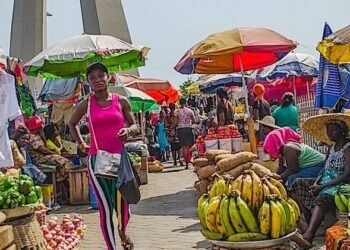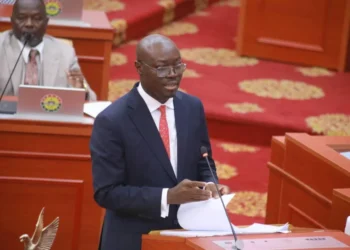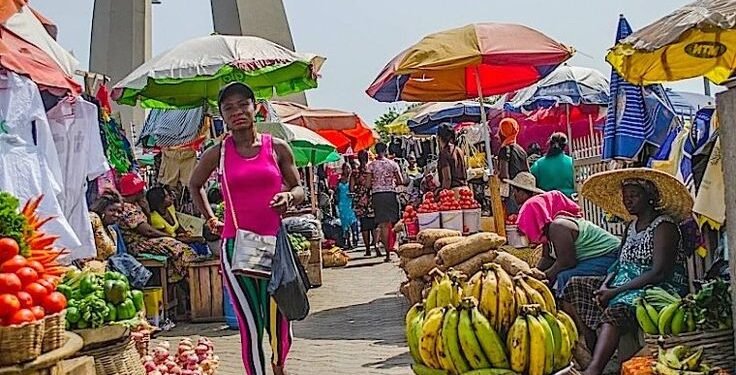A Chartered Economist and Lecturer at the Central University College (CUC), Mr. Kofi Korle, has stated that external factors are responsible for the current rising inflation in the country.
According to him, even though domestic factors also contribute to inflation, their contribution is lesser than those of external factors.
“Our economy is heavily import driven, especially oil. Oil is an essential commodity and that affect various sector of the economy. And whenever crude oil prices increase on the world market, we see it quickly reflecting in the economy; pump prices go up. And immediately transport fares also pick up. And then gradually prices of goods and services sold by market women will also see a reflection in that angle.
“So, it’s a clear indication of how the economy is; we are heavily import-driven. And it’s quite a fragile economy which is always affected by shocks”.
Mr. Korle
His comments follow the Ghana Statistical Service’s (GSS) announcement about inflation rising from 9.0 percent in July to 9.7 percent in August. The recent rise means that inflation has risen for the third consecutive month after falling to a year-long low of 7.5 percent in May this year.

Speaking to The Vaultz News, Mr. Korle stressed that the economy faces a lot of pressures from the global economy. He explained that since the country relied so much on imports, it puts pressure on the exchange rate which also play a role in price movements. Moreover, he averred that most of the manufacturers in the country relied on imported raw materials.
“This reflect in the exchange rate because we import heavily. The demand for foreign currency is very high, pushing the exchange rate further up. This also contributes towards inflation; increase the cost of production that firms and business face. Most of these firms have to import raw materials and other essentials commodities for their operations. When the exchange rate goes up, it increases their cost of production which they will also of course transfer onto the prices of the manufactured goods and services that they provide”.
Mr. Korle
Domestic factors
Nevertheless, Mr. Korle acknowledged that recent developments in the domestic economy also played a role in the price movements. He cited decline in output due to the economic fallout of the pandemic and unfavorable weather conditions as some of these factors.
Also, he pointed out that government’s revenue measures earlier this year contributed to the increment in average prices.
“On the domestic front, of course shortages of output can also bring about inflation. When productivity is low, that can fuel inflation. The weather conditions have not been favorable, hence farmers are having challenges when it comes to their cultivation. And then the increase in taxes, of course these are domestic drivers. If government policy is geared towards increasing taxes to mobilize revenues, then this can reflect on the goods and services that we buy. Especially, when these taxes are indirect then it will affect the prices of goods and services. But the contribution of these domestic factors towards inflation is lesser compared to the external factors”.
Mr. Korle
Addressing the rising inflation conundrum
Yet, Mr. Korle indicated that the situation is still not out of hand since the current inflation rate still falls within the Central Bank’s target. To address the situation, he urges the government to invest in productive sectors especially the agriculture sector to ensure food security in the country.

Additionally, he expects the Bank of Ghana to maintain its policy rate at 13.5 percent throughout the year to lower the cost of borrowing for businesses. Also, he suggested the reduction of taxes on intermediate goods and raw materials to stimulate local production.
“The inflation rate we are facing, even though it’s rising, is still mild. And it’s still within the band that the central bank has set for the economy. So, it’s not so severe, it’s mild. So, I will urge the central bank to keep the interest rate where it’s now- 13.5% or even lower. The interest rate is the cost of borrowing, the cost of doing business. The government and the central banks can work together to bring the cost of doing business to its lowest possible”.
Mr. Korle
Recent price development
The past three months has seen rising trends of inflation in the country. Inflation rose from 7.5 % in May to 7.8% in June and then to 9.0% in July. According to the GSS, Food and Non-alcoholic Beverages, Housing, Water, Electricity & Gas, and Transport remain the major drivers of inflation. Inflation for imported goods rose by 1.0 percentage points to 8.1 percent in August, from 7.1 percent in July. Similarly, inflation for locally produced items rose to 10.3 percent in August 2021 from 9.4 percent in July. External factors External factors
READ ALSO: SOE’s and Joint Venture Companies make GHS3.72 billion in joint losses- SIGA























